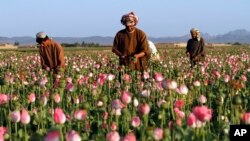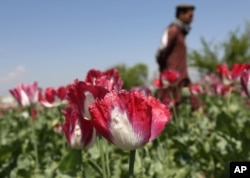A new United Nations survey says the total area under opium poppy cultivation in Afghanistan has increased by 10 percent, from 183,000 to 201,000 hectares, compared to the previous year, leading to a significant rise in the production of illicit opium.
The report by the U.N. Office on Drugs and Crime (UNODC) says potential opium production was up 43 percent, reaching 4,800 tons in 2016.
“In fact, the value of opiates produced in that country is equivalent to a considerable portion of the country's economy in 2016 - some 16 percent of the GDP - and was worth more than two-thirds of the entire agricultural sector of the country,” the UNODC noted in the report.
The illicit economy is fueling insecurity, violence and insurgency among other problems to discourage private and public investment in Afghanistan, the UNODC reiterated.
“The cultivation provided labor for an estimated 235,100 full-time jobs in 2016, and the sales of opium poppy and derivatives constituted the main source of income of opium poppy farmers, accounting for up to 57 percent of the annual household income,” according to the UNODC.
Afghanistan remains the world’s largest opium producer and exporter, despite a U.S. investment of $8.5 billion to help counter the illicit narcotics economy, which produces an estimated 80 percent of the world’s heroin, says an American government agency.
“The narcotics industry, coupled with rampant corruption and fraud, is a major source of illicit revenue,” the Special Inspector General for Afghanistan Reconstruction, or SIGAR, noted in its latest quarterly report.
The narcotics trade also undermines governance and rule of law throughout Afghanistan, SIGAR said.
U.S. anti-drugs authorities say that a "symbiotic relationship" exists between the Taliban-led insurgency and traffickers.
The traffickers, they note, provide weapons, funding and material support to the insurgency in exchange for protection, while insurgent leaders traffic drugs to finance their operations.
The commander of the U.S. and NATO forces in Afghanistan, General John Nicholson, said last December the opium trade provides about 60 percent of the funding for the Taliban insurgency.





